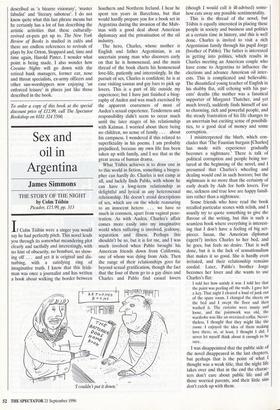Sex and oil in Argentina
James Simmons
THE STORY OF THE NIGHT
by Colm
Picador, £15.99, pp. 313 If Colm T6ibin were a singer you would say he had perfectly pitch. This novel leads you through its somewhat meandering plot clearly and tactfully and interestingly, with no hint of obscurity, no bombast, no show- ing off ... and yet it is original and dis- turbing, with a satisfying ring of imaginative truth. I know that this Irish- man was once a journalist and has written a book about walking the border between
Southern and Northern Ireland. I hear he spent ten years in Barcelona, but that would hardly prepare you for a book set in Argentina during the invasion of the Malv- inas with a good deal about American diplomacy and the privatisation of the oil industry.
The hero, Charles, whose mother is English and father Argentinian, is an uncertain young man who discovers early on that he is homosexual, and the main thread of the book charts his homosexual love-life, patiently and interestingly. In the pursuit of sex, Charles is confident; he is at ease visiting saunas and gay bars to pick up lovers. This is a part of life outside my experience; but I have just finished a biog- raphy of Auden and was much exercised by the apparent coarseness of most of Auden's sexual experience. Tenderness and responsibility didn't seem to occur much until the later stages of his relationship with Kalman. I worried about there being no children, no sense of family ... about his campness. I wondered if this related to superficiality in his poems. I am probably prejudiced, because my own life has been taken up with family, and I see that as the great arena of human drama.
What Toibin achieves is to draw one in to this world in fiction, something a biogra- pher can hardly do. Charles is not camp at all, and luckily finds Pablo, with whom he can have a long-term relationship as delightful and lyrical as any heterosexual relationship. He doesn't avoid descriptions of sex, which are on the whole reassuring to an innocent hetero ... we have so much in common, apart from vaginal pene- tration. As with Auden, Charles's affair comes more easily into my imaginative world when suffering is involved, jealousy, separation and illness. Perhaps this shouldn't be so, but it is for me, and I was much involved when Pablo brought his American friends down from California, one of whom was dying from Aids. Then the range of their relationships goes far beyond sexual gratification, though the fact that the four of them go to a gay disco and Charles and Pablo find casual lovers 'I couldn't put it down.'
(though I would call it ill-advised) some- how cuts away any possible sentimentality. This is the thread of the novel, but Toibin is equally interested in placing these people in society and business and politics at a certain time in history, and this is well done. Charles is invited to visit a rich Argentinian family through his pupil Jorge (brother of Pablo). The father is interested in getting into politics, which results in Charles meeting an American couple who have come to Argentina to influence the elections and advance American oil inter- ests. This is complicated and believable. The dissatisfied young teacher of English in his shabby flat, still echoing with his par- ents' deaths (the mother was a fanatical supporter of Margaret Thatcher, and yet much loved), suddenly finds himself of use to charming, rich and powerful people, and the steady frustration of his life changes to an uncertain but exciting sense of possibili- ties, to a good deal of money and some corruption.
I misinterpreted the blurb, which con- cludes that 'The Faustian bargain [Charles] has made with experience gradually becomes a nightmare.' There is talk of political corruption and people being tor- tured at the beginning of the novel, and I presumed that Charles's wheeling and dealing would end in such horrors; but the nightmare is no more than the certainty of early death by Aids for both lovers. For me, sickness and true love are happy famil- iars rather than a nightmare.
Some friends who have read the book recalled particular scenes with relish, and I usually try to quote something to give the flavour of the writing, but this is such a seamless book where everything is interest- ing that I don't have a feeling of big set- pieces. Susan, the American diplomat (agent?) invites Charles to her bed, and he goes, but feels no desire. That is well done, but it is the lack of sensationalism that makes it so good. She is hardly even irritated, and their relationship remains cordial. Later, Pablo's brother Jorge becomes her lover and she wants to use Charles's flat: I told her how untidy it was. I told her that the paint was peeling off the walls. I gave her a key. That night I cleared a load of junk out of the spare room. I changed the sheets on the bed and I swept the floor and then washed it. The curtains were musty and loose, and the paintwork was old, the wardrobe was like an oversized coffin. Never- theless, I thought that they might like the room. I enjoyed the idea of them making love there, or, at least, I thought I did. I never let myself think about it enough to be sure.
I was disappointed that the public side of the novel disappeared in the last chapters, but perhaps that is the point of what I thought was a weak title, that the night life takes over and that in the end the charac- ters don't care about public life and all those worried parents, and their little sins don't catch up with them.


















































































 Previous page
Previous page